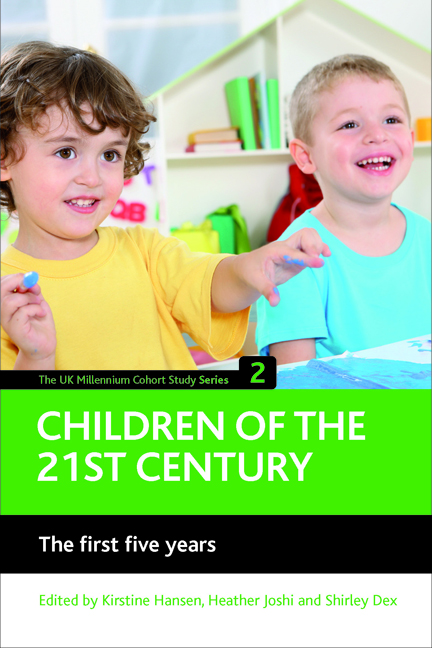Book contents
- Frontmatter
- Contents
- Acknowledgements
- List of contributors
- Glossary
- one Introduction
- two Child poverty in the first five years of life
- three Ethnicity, community and social capital
- four Parental relationships and parenting
- five Partnership trajectories, parent and child well-being
- six Employment trajectories and ethnic diversity
- seven Neighbourhoods and residential mobility
- eight Childcare in the pre-school years
- nine Intergenerational inequality in Early Years assessments
- ten Ethnic inequalities in child outcomes
- eleven School choice
- twelve Teacher assessments in the first year of school
- thirteen Childhood overweight and obesity
- fourteen Resilience in children's development
- fifteen Parental and child health
- sixteen Conclusions
- References
five - Partnership trajectories, parent and child well-being
Published online by Cambridge University Press: 01 September 2022
- Frontmatter
- Contents
- Acknowledgements
- List of contributors
- Glossary
- one Introduction
- two Child poverty in the first five years of life
- three Ethnicity, community and social capital
- four Parental relationships and parenting
- five Partnership trajectories, parent and child well-being
- six Employment trajectories and ethnic diversity
- seven Neighbourhoods and residential mobility
- eight Childcare in the pre-school years
- nine Intergenerational inequality in Early Years assessments
- ten Ethnic inequalities in child outcomes
- eleven School choice
- twelve Teacher assessments in the first year of school
- thirteen Childhood overweight and obesity
- fourteen Resilience in children's development
- fifteen Parental and child health
- sixteen Conclusions
- References
Summary
Introduction
The structure of British family life has undergone substantial changes over recent decades. Rises in extra-marital childbearing, cohabitation and parental separation coupled with declines in marriage have translated into more diverse, complex, transient and often inequitable family settings for children. Very large movements in financial circumstances of families can often be associated with these family changes and family changes can also affect the emotional well-being of family members. Consequently, there has been growing concern about the instability of family life and the impact on the well-being of children which has led to a plethora of inquiries, reports and initiatives around children, for example, A good childhood (Layard and Dunn, 2009), Social Justice Policy Group (2006), Every Child Matters (HM Treasury, 2003), and The Children's Plan (DCSF, 2007).
A substantial body of research already exists on the consequences of divorce and remarriage for British children both in the short and the long term (see Kiernan, 1997; Rogers and Pryor, 1998) but much less is known about the potential consequences for children of being born into different family settings and whether subsequent family trajectories matter. This chapter explores these issues. We start by looking at changes over the first five years of the children's lives and map the family trajectories of children born into four different settings: to married parents, cohabiting parents, to solo mothers who were in a relationship with the father at the time of the birth and those who were not in a relationship at that time. By following the partnership behaviour of these parents over the first five years of the child's life we can assess the extent to which there is stability or change in the lives of the Millennium Cohort Study (MCS) children. Given there is a good deal of ethnic diversity in the parental context within which children are born, we also examine the trajectories for mothers from different ethnic groups. Frequent accompaniments to family transitions are changes in the economic circumstances of families and in the emotional well-being of the parents and children; the second half of the chapter is devoted to these issues.
- Type
- Chapter
- Information
- Children of the 21st century (Volume 2)The First Five Years, pp. 77 - 94Publisher: Bristol University PressPrint publication year: 2010
- 1
- Cited by



